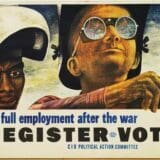

you want dogs? I walked all four shepherds
in the park, by day and dark
and nobody dared come near; bark?
all they had to do was walk,
the four big shepherds in the park
love? you want love? I hardly miss her;
but her dogs I walked
by day and dark, yes,
I miss the dogs, the four
big shepherds in the park.
——————————————————–——————————————————–
Source: Intensifications, published by Red Hen Press (2010).
Originally from Brooklyn, N.Y., Austin Straus has been drawing and painting since childhood, but began writing seriously in his mid-thirties. His poems and illustrations have appeared in such literary magazines and anthologies as Caliban, Grand Passion, Jacaranda Review, Red Dance Floor and The Maverick Poets. Known as the host of KPFK’s The Poetry Connexion,


The National Labor Relations Board (NLRB) is now fully staffed and able to continue to function to protect workers’ rights after the U.S. Senate today confirmed five members. The votes end a months-long blockade on President Obama’s nominees by Senate Republicans who threatened to shut the board down Aug. 27.
AFL-CIO President Richard Trumka says the confirmations are:
Good news for all workers seeking to exercise the rights they are guaranteed by law. Those essential rights include the ability to bargain together for fair wages and living standards and a workplace safe from abuse, harassment and intimidation.
The five members are current NLRB Chairman Mark Pearce; Nancy Schiffer, a former AFL-CIO associate general counsel; and NLRB attorney Kent Hirozawa, currently the chief counsel to Pearce; and attorneys Philip Miscimarra and Harry Johnson, who represent management in labor-management relations.
Earlier this month, as Senate Majority Leader Harry Reid (D-Nev.) was set to change Senate rules that would have eliminated filibusters against certain executive branch nominees,
» Read more about: Finally: National Labor Relations Board at Full Strength »


Last November unions won a resounding victory when voters defeated Proposition 32, a ballot measure that would have crippled labor’s political influence in California, partly by barring public-employee unions from using payroll-deducted funds for political purposes. The initiative, which enjoyed a huge lead in early opinion polls, was heavily funded by wealthy conservatives and far-right groups.
Union leaders were overjoyed by its defeat.
“You can’t buy California,” Dean Vogel, president of the California Teachers Association (CTA), told an election-night victory party in Sacramento. “We’re not for sale.”
The celebration hasn’t been long lived. In a little-noticed move in April, a conservative legal organization that has pushed to overturn the 1964 Voting Rights Act filed a lawsuit in federal court in Santa Ana that could accomplish in the courts what Prop. 32 couldn’t at the ballot box. The players behind the suit may not be household names but the millionaires and private foundations covering their legal fees represent a familiar klatch of extreme libertarians who,
» Read more about: Prop. 32 Ghost Looms Over Lawsuit Against Teachers Union »
Imagine a Mexican father telling his child that he’s leaving for America. He probably wouldn’t spend a lot of time explaining the complicated economic and political relationship between Mexico and the U.S., nor would he spend a lot of time explaining how difficult and dangerous the journey to el norte would be.
It would be a simple explanation, in all likelihood: “I have to go north to find work to earn money for my family.”
The children’s story Pancho Rabbit and the Coyote by Duncan Tonatiuh starts with a statement much like that. Like so many Mexican workers, Pancho Rabbit’s father decides go to north because of lack of work at home – “The rains did not come and the crops would not grow.”
Papá Rabbit, along with companions including Señor Ram and Señor Rooster, leave at the beginning of the story. The story is told from the point of view of Papá Rabbit’s family,


Last week President Obama gave a speech at Knox College in Illinois in which he announced plans to return his focus to the economy. The agenda he outlined centered on policies to rebuild the middle class leading to growth from the middle out as he put it.
The basic idea sounds good. There are few who would take issue with the focus of his policies: improving the nation’s infrastructure, better school to work transitions, high quality pre-school for everyone. These ideas all score very high in opinion polls and focus groups, although there might be serious differences on what they mean concretely.
But even if we can agree on the best way to rebuild our infrastructure, better our schools, and guarantee high quality pre-school education we will still face serious economic problems well into the future for the simple reason that the economy lacks demand. Generating demand has to be issue one,
» Read more about: A Demand Economy: What’s Needed for Growth »


For many Millennials, the present higher education system exudes an overwhelming sense of permanence. In our short lives, college tuition has always been high, education funding has always been decreasing, and college has always meant a risky “investment in our futures.” We know that these yearly tuition hikes are wrong, and that the current tuition rates already saddle us with debt we probably won’t pay off until we retire, if we retire. For many of us, the consequences are much more immediate, as many low-income students cannot afford higher education anymore. Yet we continue to shell out the money, or take out the loans. Confronted with the institutional power of the higher education system, we feel powerless.
Depressing, right? But history shows us that all is not lost by exposing the mechanisms that brought about the status quo. In their Fall 2012 article in Dissent, Aaron Bady and Roosevelt Institute Fellow Mike Konczal reveal what higher education used to mean and how it was systematically destroyed.
» Read more about: Millennials: Lower Expectations for Higher Education »


Every year Walmart holds a combination shareholder meeting and pep rally to whip up enthusiasm and promote its image as a good investment and a good corporate citizen. These huge events have the quality of a religious revival meeting, including testimonials and music to keep its stockholders and employees (whom Walmart calls “associates”) enthralled. Women’s Wear Daily called last month’s event, with 14,000 shareholders and employees, “a high-octane, entertainment-filled spectacle with moments devoted to business.”
The company always invites celebrities to entertain and mingle. At last month’s gathering in Bentonville, Arkansas — the company’s headquarters — singers Kelly Clarkson, Jennifer Hudson, John Legend, and Prince Royce performed, Hugh Jackman emceed, and Tom Cruise cruised the crowd, then mounted the stage and said: “I’ve wanted to come here for quite some time, actually because the culture you have here is like no other. I truly admire your company. [It’s] a role model for how business can address some of the biggest issues facing our world.”
» Read more about: Walmart Celebrities: Which Side Are You On? »


Thursday’s community meeting in the auditorium of Boyle Heights’ Lorena Street Elementary School was ostensibly a Los Angeles Unified School District briefing on why the school was about to share half of its classrooms and campus resources with a charter school.
The players were right out of Central Casting. To one side of Lorena Elementary’s podium stood LAUSD principal Enrique Soberanes — a rumpled, embattled Jaime Escalante-esque embodiment of an inner-city public school educator.
Opposite Soberanes, standing tall and lean and tanned was the impeccably tailored Dr. Jim Kennedy, looking more a William Morris Endeavor agent than the incoming principal of Walton Family Foundation-backed Extera Public School No. 2, the new K-1 charter school being imposed on Lorena Street as a co-locator.
Facing the principals were roughly 75 bewildered, mostly Spanish-speaking and working class parents, their children and a score of frustrated and angry LAUSD teachers.
» Read more about: “Co-Location” Controversy in Boyle Heights »


Big Oil says we ought to be supporting fracking because it causes less air pollution than other forms of energy, such as coal or even conventional oil drilling. As is frequently the case in these fights over facts, the oil companies have it about half right – maybe less.
Fracking technology pumps a mix of water, chemicals and sand a mile or so into the earth’s crust to release natural gas captured between layers of rock that the usual methods of drilling couldn’t touch. It’s birthed a modern day gold rush as the petroleum companies hurry to be the first to drill the Barnett Shale in Texas or the Marcellus Shale that lies beneath parts of Pennsylvania, New York, Ohio, Virginia, West Virginia, Kentucky and Maryland. Closer to home, there is the Monterey Shale formation in the old oil fields around Taft, west of Bakersfield.
Push below the surface of the big oil theme and we learn that while burning natural gas for fuel produces only about half the carbon emissions as coal,
» Read more about: Big Oil Has Big Plans for Our Environment »


It’s not coincidental that at this very moment both the labor and racial justice movements stand at a crossroads in our nation’s consciousness. The people who fight to undo worker’s rights and assault unions are often the very same folks who craft laws and policies that allowed Trayvon Martin’s killer to walk free, that disenfranchise black voters and expand the use of racial profiling. Moreover, the public rhetoric of post-racialism is closely tied to the false promise of rampant corporate profiteering that casts the labor movement as an irrelevant “special interest.”
In 2013 the landscape of the national labor movement could charitably be described as “receding.” Last year the U.S. Bureau of Labor Statistics reported a national union membership rate of 11.3 percent — down from 11.8 percent in 2011.The ever-declining number of union members in 2012 was 14.4 million, while in 1983, the first year for which comparable union data are available,
» Read more about: At a Crossroads: Labor Faces the Future »